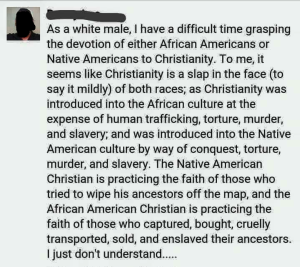
 This objection seems to pull on the heart strings of the individual. The black person who recognizes their history and everything that has happened to them will recognize that their race is sacred. They will recognize that despite that, people have oppressed them and robbed them of their human value. Many people of African descent will feel a measure of pride and effervescence concerning their race. Opponents of Christianity labor to pit that pride and effervescence against their Christian faith. The Christian faith should be seen as an enemy of their pigmentation. Christianity is a white mans’ religion, and we have manipulated the black man into believing it. Is that the case?
This objection seems to pull on the heart strings of the individual. The black person who recognizes their history and everything that has happened to them will recognize that their race is sacred. They will recognize that despite that, people have oppressed them and robbed them of their human value. Many people of African descent will feel a measure of pride and effervescence concerning their race. Opponents of Christianity labor to pit that pride and effervescence against their Christian faith. The Christian faith should be seen as an enemy of their pigmentation. Christianity is a white mans’ religion, and we have manipulated the black man into believing it. Is that the case?
 There is only one race – the human race. Christian theology proposes that mankind is made in the image of God. This means that there is something special about us that renders us distinct from animals. We have intrinsic value. Human beings have intrinsic rights. They are not to be abused or used as means to an end. Human beings are ends in and of themselves. There are many bigots who will suggest that there are some biological human beings who are not really persons, and often among them, will be those with a different pigmentation. But the Christian view is that if somebody is a biological human being, it follows that they are made in the image of God. As the apostle Paul said, unifying all races, “There is neither Jew nor Greek, there is neither slave nor free man, there is neither male nor female; for you are all one in Christ Jesus.” (Galatians 3:28). Pigmentation is merely the result of your adaptation and where your ancestors lived. It is of no more significance than a freckle or a sunburn.
There is only one race – the human race. Christian theology proposes that mankind is made in the image of God. This means that there is something special about us that renders us distinct from animals. We have intrinsic value. Human beings have intrinsic rights. They are not to be abused or used as means to an end. Human beings are ends in and of themselves. There are many bigots who will suggest that there are some biological human beings who are not really persons, and often among them, will be those with a different pigmentation. But the Christian view is that if somebody is a biological human being, it follows that they are made in the image of God. As the apostle Paul said, unifying all races, “There is neither Jew nor Greek, there is neither slave nor free man, there is neither male nor female; for you are all one in Christ Jesus.” (Galatians 3:28). Pigmentation is merely the result of your adaptation and where your ancestors lived. It is of no more significance than a freckle or a sunburn.
 Thus there should be a camaraderie among all human beings. All of us should unite as one despite our pigmentation. However, the person who thinks that black people should abdicate their role in Christianity seems to be assuming that there is no camaraderie between white people and black people. Consider the objection. The objector is saying that it makes more sense for a white man to become a Christian than for a black man. But why? The implication is that black people are not “one of us.” Does the history of slavery prove that black people should not be Christians? This objection seems to have racist underpinnings. Why is it objectionable for the black man but not for the white man? If Christianity were inherently racist, then everybody should be opposed to it. White people should be equally opposed to it because black people are “one of us.” It is an asinine assertion to suggest that only black people should be opposed to it. Why not everybody? The objector must think that black people have an inner camaraderie that white people do not share with them.
Thus there should be a camaraderie among all human beings. All of us should unite as one despite our pigmentation. However, the person who thinks that black people should abdicate their role in Christianity seems to be assuming that there is no camaraderie between white people and black people. Consider the objection. The objector is saying that it makes more sense for a white man to become a Christian than for a black man. But why? The implication is that black people are not “one of us.” Does the history of slavery prove that black people should not be Christians? This objection seems to have racist underpinnings. Why is it objectionable for the black man but not for the white man? If Christianity were inherently racist, then everybody should be opposed to it. White people should be equally opposed to it because black people are “one of us.” It is an asinine assertion to suggest that only black people should be opposed to it. Why not everybody? The objector must think that black people have an inner camaraderie that white people do not share with them.
 There were black people in the Bible, and probably no white people. The majority of the biblical narrative chronicles the history of ethnic Jews. Most of the people throughout the Bible were Jewish, and did not share the pigmentation of the Caucasian. Jesus was not a white man. There is a temptation among people to want to imagine Jesus as sharing the same pigmentation as they do. Many television programs about the life of Jesus will depict him as a white man. Likewise, there are some groups that depict Jesus as a black man. These varying views of Jesus’ pigmentation strike many with malaise. Sometimes white people will dislike seeing a black Jesus because they feel as though they cannot relate to him as well as they would a white Jesus. But, in reality, Jesus was not white. He was an ethnic Jew. This means that he looked like a Middle Eastern man.
There were black people in the Bible, and probably no white people. The majority of the biblical narrative chronicles the history of ethnic Jews. Most of the people throughout the Bible were Jewish, and did not share the pigmentation of the Caucasian. Jesus was not a white man. There is a temptation among people to want to imagine Jesus as sharing the same pigmentation as they do. Many television programs about the life of Jesus will depict him as a white man. Likewise, there are some groups that depict Jesus as a black man. These varying views of Jesus’ pigmentation strike many with malaise. Sometimes white people will dislike seeing a black Jesus because they feel as though they cannot relate to him as well as they would a white Jesus. But, in reality, Jesus was not white. He was an ethnic Jew. This means that he looked like a Middle Eastern man.
This should not strike us as surprising. In fact, most of the people throughout the Bible have been non-white and usually ethnic Jews. Caucasian followers of God are an abnormality! Even in the history of the early church, most of the Christians were not white. Most were Middle Eastern. Many were even from Africa, hence, they were black. Doctor Dan Rogers, a scholar in historical theology, has pointed out in his article Evidence of Black Africans In The Bible that Abraham probably mingled with black people. The Ethiopian Eunuch in the New Testament could have been black. The descendants of Cush were probably black. Ishmael was probably black. His descendants known as the Kedarites were probably black. Does the history of slavery prove that black people should not be Christians? Not at all. They are continuing in the tradition of their earliest ancestors. There are a lot of black people throughout both the Old and the New Testament and there is no indication that there is an inferior pigmentation.
Should black people be Americans? This detractor of the Christian faith in this situation is not so interested in logical discourse. They are interested in emotional manipulation. They are not asking whether they are being reasonable. They are asking how they can manipulate this individual into abandoning their faith. There is an underlying logical assumption in this argument that is being ignored. If an adherent to a system of belief treats me poorly, does it follow that this system of belief is false or immoral? Does it follow that they are abiding by their pure and undefiled beliefs? Think of it like this. Imagine that I were once beat up by a group of black men. Later, I am found associating with a friend of mine who happens to share the pigmentation of my persecutors. Am I behaving inconsistently? Of course not. Indeed, it would be foolish for me to say that I cannot associate with any black people because in the past, some have treated me poorly.
Further, a similar objection could be raised about whether black people should be Americans. They were brought here in chains and forced into slavery. In fact, there is still a higher percentage of black people in the areas that they were forced into slavery. Are they behaving inconsistently? Do we have trouble reconciling this? I should not think so. Just because the United States has treated them poorly in the past, does not mean that they should cease being Americans. Does the history of slavery prove that black people should not be Christians? Only if you are willing to say that black people should not be Americans and that anybody who has been persecuted by a black people should disassociate with their friends.
The Bible forbids the practice of slavery as seen in the American south. The conception of slavery in the Bible is quite different from the practice of slavery in the American south. In ancient Israel, there was no prison system. So if somebody were to work off a crime, they would be put into slavery. Further, Gentiles sometimes had the option to sell themselves into slavery to Israelites. They did not want to live in poverty, unable to feed their family. So they would sell themselves into slavery for a finite period of time. This is the practice of slavery that we see in the Bible. But it does not contain man-hunting and the devaluation of human beings, which are central to the conception of slavery in the American south.
European men would invade Africa and kidnap people. They would take people from their homes, separate them from their families and sell them as though they were a mule. The only difference is that it is illegal to steal a mule. Yet this practice is forbidden by the Bible. Exodus 21:16 reads, “Whoever steals a man and sells him, and anyone found in possession of him, shall be put to death.” Further, one of the more abominable practices of these slavers was the practice of sex slavery. But the biblical data also forbids that as I demonstrated in my article, Does Islam Allow Sex Slavery? Does the history of slavery prove that black people should not be Christians? Not at all. It proves that Christians have disobeyed the Bible.
Wise people should align themselves with what is true. As we wrestle with the polemics of world religion, what questions ought we ask ourselves? Should we ask ourselves, “How have the adherents to this world religion treated people?” That is certainly an interesting question. But it does not establish that world religion as true or false. It only demonstrates that adherents to the world religion are flawed. Unless there is some doctrine that says that all adherents to the religion will be perfect then it does nothing to undermine that religion. This means that we should be asking ourselves, “Is this religion true?”
This will lead one to ask different questions. It will lead one to ask who Jesus was. It will lead one to ask whether he was telling the truth about his claims and ultimately, whether he actually rose from the dead. If Jesus really did rise from the dead, then we can be confident that he was who he claimed to be and that he has the authority to forgive our sins and give us the free gift of eternal life. I would like you to begin exploring the available evidence and looking for answers to this question. As a Christian, I am firmly convinced that God exists and that he raised Jesus from the dead. You will notice that you have stumbled upon a website titled “ThereforeGodExists.com”. I engage with the claims of atheists and present evidence for the Christian faith. You may begin by reading my article, Did Jesus Rise From The Dead?
If you would like to get in on the discussion about this, join my Theology Discussion Group!